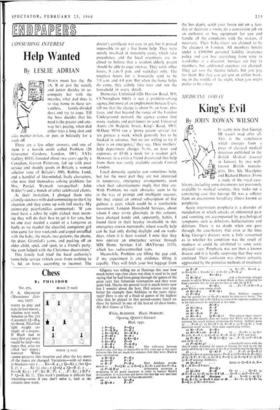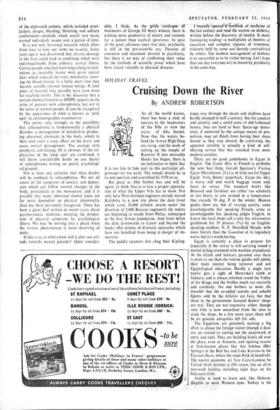MEDICINE TOD.4Y
King's Evil
By JOHN ROWAN WILSON
o Ir seems now that George
Acute intermittent porpbyria is a disorder of metabolism in which attacks of abdominal pain and vomiting are accompanied by psychological symptoms. such as delusions, hallucinations and delirium. There is no doubt when one goes through the case-history that even at the time King George's doctors were a little concerned as to whether his condition was the result of madness or could be attributed to some toxic physical state. Porphyria was not then a known disease and it is hardly surprising that they were confused. Their confusion was almost certainly aggravated by the primitive methods of treatment of the eighteenth century, which included strait- jackets, purges, bleeding, blistering and solitary confinement—methods which would turn many normal individuals insane over a period of time.
It is not only historical research which alters from time to time our views on insanity. Some years ago it was discovered that chronic damage to the liver could lead to conditions which were indistinguishable from ordinary mental illness. Certain people who had been languishing in insti- tutions as incurably insane were given special diets which reduced the toxic metabolites enter- ing the blood stream; in a fairly short time they became sensible rational human beings. A later piece of research may possibly have even more far-reaching results. This is the discovery that a certain chemical known as DMPE appears in the urine of patients with schizophrenia but not in. the urine of normal people. It can be recognised by the appearance of what is known as 'pink spot' on chromatographic examination.
This points very strongly to the possibility that schizophrenia is fundamentally a physical disorder, a derangement of metabolism produc- ing abnormal chemicals in the body, which in their turn exert a toxic effect on the brain and cause mental derangement. The analogy with porphyria and George III is obvious. If the im- plications of the 'pink spot' are confirmed, it will throw considerable doubt on any theory of schizophrenia resting on purely psychologi- cal grounds.
Nor is there any certainty that these doubts will be confined to schizophrenia. We are all aware of the symptoms of anxiety and depres- sion which can follow normal changes in the body, particularly at the menopause, and it is possible that many abnormal mental states are far more dependent on physical abnormality than has been previously recognised. There has been a great deal written in recent years about psychosomatic medicine, meaning the produc- tion of physical symptoms by psychological illness. We may be moving into a phase when the reverse phenomenon is more deserving of study.
If this is so, to what extent will it alter our atti- tude towards mental patients? Quite consider- ably, I think,. As the •-grisly ='catalogs e treatments of George III bears witness, there is nothing more productive of misery and torment for a patient than medical ignorance. In spite of the great advances since that date, psychiatiy is still in the pre-scientific era. Theories of causation and treatment abound in psychiatry, but there is no way of confirming their value by the methods of scientific proof which have been found ,valuable in physical diseases.
rtticentlilOpenedVrextl4ok of medicine of the last century and 'read the section on diabetes, written before the discovery of insulin. It made fascinating reading—a multiplicity of theories of causation and complex regimes of treatment, violently held by some and fiercely contradicted by others. The modern management of diabetes is so successful as to be rather boring. Let's hope that one day everyone will be bored by psychiatry in the same way.



































 Previous page
Previous page